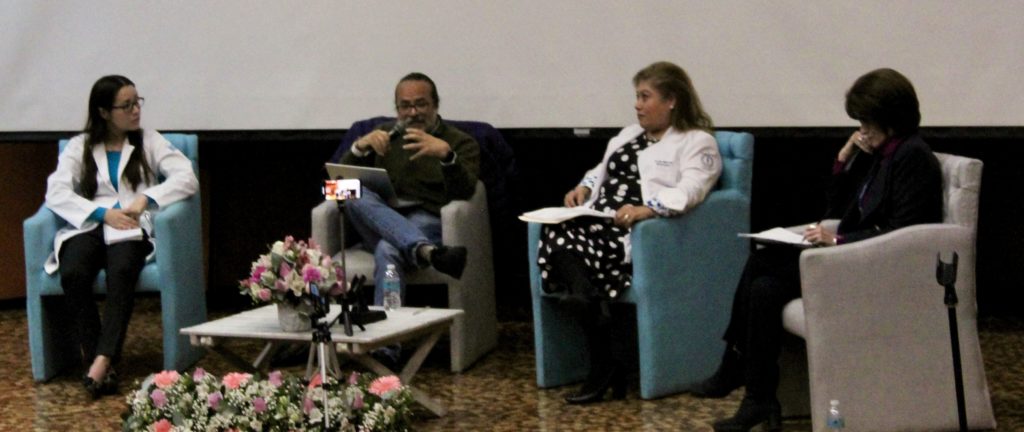In this blog Gina Tarditi, a psychologist in Mexico City and End of Life Studies MSc student, describes an event she organised with oncologists to debate 2022 Lancet Report on the Value of Death.
I work at The National Cancer Institute (INCAN) in Mexico City which is one of the largest cancer centers in Latin America. The center receives more than 5000 patients and about 250 new residents annually. Each Wednesday, we have a medical session as part of the continuing medical education activities. The diversity of topics is enormous: immunotherapy; new surgical interventions; advances in genetic research; oncological nutrition; psycho-oncology; and palliative care are just a few examples.
I am a student within the End of Life Studies MSc Programme and recently took a course where we discussed the 2022 international Report of the Lancet Commission on the Value of Death: Bringing Death back to Life. Through my experience as a student in the MSc programme, I have come to better understand the importance of approaching patients from an interdisciplinary perspective. Such a perspective helps me grasp the continual interplay between the different sociocultural, political, economic, and spiritual contexts that influence actions and behaviors in patients, families, and health professionals. The Lancet report also used the same perspective, and I became so interested how a medical body used interdisciplinarity to frame dying and death that I proposed a round table for a medical session to reflect on it and share it with others at the National Cancer Institute.

The Round Table Discussion at the National Cancer Institute
The session took place on October 12, 2022. The round table guests were: Dr. Silvia Allende, chief of the palliative care department at the National Cancer Institute, INCAN; Dr. Nexai Reyes, from the palliative care department of the National Institute of Medical Sciences and Nutrition, Salvador Zubirán (INCMNSZ), and Dr. Jorge Linares, philosopher and researcher at the Autonomous National University (UNAM). I had the privilege of moderating the debate. Each guest had three rounds of three minutes each in which to develop a specific position in responding to my prepared prompts, and a final round to offer concluding thoughts or to make recommendations.

The Paradox, the Death System and Palliative Care Provision in Mexico
The speakers agreed that the Lancet Commission provides a comprehensive picture of the challenges we face in caring for people at the end of life, where “death in the 21st century is a paradox”. This paradox arises through some people having overmedicalized deaths in hospitals, but where many others “remain undertreated, dying of preventable conditions and without access to basic pain relief”.
Dr. Allende and Dr. Reyes recognized the gap in palliative care provision in Mexico. They acknowledged that there are a few excellent palliative care services in the country, but they are concentrated in tertiary hospitals, in some big cities. According to Dr. Allende, there are 1.5 palliative care teams for every million people in Mexico. Dr. Reyes highlighted that medical professionals are not fully informed about the potential of palliative care, and acknowledged that promoting the benefits is part of the palliative care role in Mexico. Indeed, both agreed that their institutions (INCAN and INCMNSZ), are committed to palliative care, with training programmes for new multidisciplinary professionals interested in it.
Dr. Linares helped the audience to understand a quote from the Lancet report: “Without death, every birth would be a tragedy.” To him, death is not only natural but necessary as it guarantees the human race’s continuation and renovation. Without death, there would be an extraordinary social revolution. He identified the current climate crisis and non-human deaths as generating increasing global concern that is the necessary pre-condition to action. Finally, he expressed that death may always have meaning, no matter how many years a person lives.
The speakers also shared their opinions on how end of life care in Mexico is moving toward biomedical global North trends in urban areas, while in rural regions, people still maintain the traditional rituals that provide emotional, social, spiritual, and practical support for the sick, the vulnerable, and for those grieving. While good medical care is necessary, they also warned of the risks that following a biomedical-only model of care may bring to our country, echoing the concerns raised by the Lancet Commission Report.
How the Covid-19 Pandemic Highlighted Health Inequalities
One interesting point that each speaker brought to the table concerned how Covid-19 has highlighted the weakness of health systems globally. They spoke about how the pandemic drew attention to huge inequalities which requires involvement from all sectors of the society. Finally, they all agreed about the need to work together to support diverse communities caring for people nearing the end of life, and to keep talking about death and dying both in and outside of medical settings.
Surprisingly, nobody ran off when the clock hit the hour mark ending the session. We ended the session 10 minutes late, with some doctors staying a little longer to propose another, related session that would review the literature on death and dying. Afterwards I received comments such as “Thanks for bringing this topic to us; we, oncologists, are stubborn, and that explains why we keep treating patients to get some more days or weeks for them.”
The Lancet Report sets out five principles of what they call a “realistic utopia: a new vision of how death and dying could be”. It is my hope that the medical session I organized, and the interest it has generated, can contribute to this vision.

Gina Tarditi lives in Mexico City. She works at INCAN’s Integrative Oncology Center. She is psychologist specializing in bereavement. She is also a student in the End of Life Studies MSc/PGDip/PGCert Programme.

